Diplomatic Bluebook 2024
Chapter 2
Resilient and Unwavering Regional Diplomacy
2 Regional Situations in Europe
(1) The European Union (EU)
The EU is a political and economic union consisting of 27 member states with a total population of about 448 million. It is a strategic partner of Japan that works together to uphold and strengthen the free and open international order based on the rule of law, and to address the common challenges of the international community.
<Recent Developments of the EU>
In response to Russia's aggression against Ukraine, the EU has adopted 12 sanctions packages against Russia since February 2022. These sanctions include asset freezes and travel restrictions on more than 1,900 individuals and entities; economic sanctions in the services field, including finance, transportation, energy, defense, and raw materials; and restrictions on the media. For the 12th sanctions package announced at the European Council meeting in December 2023, it was decided to take measures including the designation of additional entities, the addition of items subject to import and export bans such as an import ban on Russian diamonds, and the strengthening of the implementation of the oil price cap. In addition, the EU and EU member states have provided support to Ukraine in the form of macro-financial assistance, budgetary support, emergency assistance, and crisis response and humanitarian assistance, totaling approximately 40.5 billion euros (of which approximately 31 billion euros was support from the EU) (as of November 2023). In February 2024, the European Council decided to provide up to 50 billion euros in financial assistance from 2024 to 2027. Furthermore, the EU and EU member states have provided military assistance totaling over 27 billion euros. Within this total, the EU is providing assistance in the form of lethal military equipment for defensive purposes to the Ukrainian military through the European Peace Facility, as well as conducting training for 40,000 Ukrainian troops through EUMAM Ukraine, which was launched in November 2022. President Charles Michel of the European Council and President Ursula von der Leyen of the European Commission visited Kyiv in February for the 24th EU-Ukraine Summit and stated that support for Ukraine would be continued as long as necessary. With regard to Ukraine's accession to the EU, in December the European Council decided to commence negotiations on accession by Ukraine.
In addition, in response to the armed conflict between Israel and Hamas and other Palestinian armed groups since October 7, the European Commission decided in November to increase humanitarian assistance to Palestine to over 100 million euros.
<EU-China Relations>
President Michel of the European Council and President von der Leyen of the European Commission visited China in December and attended the 24th EU-China Summit in Beijing.
<Japan-EU Relations>
Japan and the EU are strengthening their cooperation under the Japan-EU Economic Partnership Agreement (Japan-EU EPA), which entered into force in 2019, and the Japan-EU Strategic Partnership Agreement (Japan-EU SPA), of which provisional application started at the same time. In July, Prime Minister Kishida visited Brussels, Belgium for the 29th Japan-EU Summit Meeting with President Michel of the European Council and President von der Leyen of the European Commission. During the Summit, the leaders of Japan and the EU exchanged views on international and regional affairs, centered on Russia's aggression against Ukraine, the situation in East Asia, and North Korea, as well as security, economic security, digital partnerships, and green energy, and concurred on Japan-EU cooperation in a wide range of fields. They also welcomed the EU's decision to lift import restrictions on Japanese food products and announced the launch of a foreign ministers' strategic dialogue to take cooperation in the security field to a new level.
Prime Minister Kishida conducted telephone calls with President von der Leyen of the European Commission in March, June, and October. He also participated in the Global Gateway Forum4 held by the European Commission in October by sending a video message.
In May, Foreign Minister Hayashi attended the EU Indo-Pacific Ministerial Forum co-hosted by the EU and Sweden, which held the EU Presidency in the first half of 2023. He stated that the security of Europe and that of the Indo-Pacific cannot be discussed separately, and that it is important for like-minded countries to maintain unity beyond regional boundaries in order to uphold the free and open international order based on the rule of law. In addition, Foreign Minister Hayashi held a Japan-EU Foreign Ministers' Meeting with High Representative of the European Union for Foreign Affairs and Security Policy Josep Borrell Fontelles during the Meeting of NATO Ministers of Foreign Affairs in Brussels, Belgium in April, and Foreign Minister Kamikawa held a Japan-EU Foreign Ministers' Meeting with High Representative of the European Union for Foreign Affairs and Security Policy Borrell during the G7 Foreign Ministers' Meeting held in Tokyo, Japan in November.
The EU, with its economic scale that follows the United States (U.S.) and China, is an important economic partner of Japan, ranking fourth among Japan's import partners, third among export partners, and second in terms of the balance of direct investment in Japan.
The Japan-EU EPA, which entered into force in 2019, created a massive economic zone accounting for approximately 20% of the global GDP, under which the ties between Japan and the EU have further strengthened. Steady implementation and operation of the agreement in various fields have been ensured through the Japan-EU EPA Joint Committee (a meeting was held in April 2023 between Foreign Minister Hayashi and Executive Vice President Valdis Dombrovskis of the European Commission) as well as specialized committees and working groups. Furthermore, in June, as a framework for promoting a broader strategic partnership with the EU, Foreign Minister Hayashi, together with Minister of Economy, Trade and Industry NISHIMURA Yasutoshi and Executive Vice President Dombrovskis of the European Commission, held the Japan-EU High-Level Economic Dialogue and confirmed that Japan and the EU will further cooperate with regard to Japan-EU economic policy collaboration, economic security, and the rules-based free and fair trade framework. In addition, in October, during the G7 Trade Ministers' Meeting in Osaka-Sakai, Foreign Minister Kamikawa, together with Minister for Economy, Trade and Industry Nishimura and Executive Vice President Dombrovskis of the European Commission, held the Japan-EU High-Level Economic Dialogue for the second time that year. They confirmed that an agreement in principle had been reached on the negotiations on the inclusion of provisions on the free flow of data into the Japan-EU EPA and confirmed their intention to accelerate the work toward an early signing. Furthermore, the participants also exchanged views on the most recent pending issues, such as addressing economic coercion, building resilient supply chains, and export control, and confirmed the importance of cooperation among the G7 and like-minded countries. Going forward, Japan will continue to ensure the steady implementation of the Japan-EU EPA and leverage other dialogue frameworks, including the Japan-EU High-Level Economic Dialogue, with the aim of further developing Japan-EU economic relations. Furthermore, the Japan-EU Agreement on Bilateral Agreements between Japan and the Member States of the EU for Air Services, which lays the foundation for stable development of Japan-EU air services, was signed in February and entered into force on October 1.
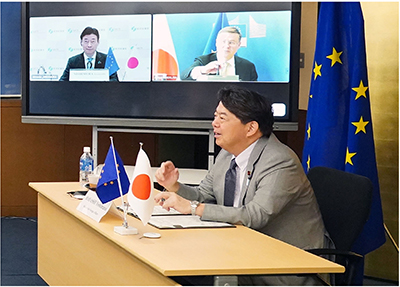 Foreign Minister Hayashi attends the Japan-EU High-Level Economic Dialogue (online format) (June 27, Tokyo)
Foreign Minister Hayashi attends the Japan-EU High-Level Economic Dialogue (online format) (June 27, Tokyo)- 4 Global Gateway: In December 2021, the EU announced the Global Gateway, a new connectivity strategy for infrastructure development investment, to address the lack of funding for sustainable development around the world.
(2) United Kingdom
In January, Prime Minister Rishi Sunak announced his policy to promote efforts to achieve five commitments (halving inflation by 2023, economic growth, reducing government debt, improving the National Health Service, and taking measures against illegal immigration) in his address at the beginning of the year. In February, Prime Minister Sunak and President von der Leyen of the European Commission announced a new agreement (the Windsor Framework) on the Northern Ireland Protocol, which forms part of the UK's agreement for withdrawing from the EU, including simplification of procedures for the transport of goods between the UK mainland and Northern Ireland. This was positioned as a turning point in UK-EU cooperative relations, which had been difficult since the UK's withdrawal from the EU (Brexit). In March, the Government of the UK announced the Integrated Review Refresh, endorsed the “Free and Open Indo-Pacific (FOIP)” vision, said that the UK had achieved its Indo-Pacific “tilt,” and positioned engagement with the region as a permanent pillar of UK international policy.
There was an active dialogue between the governments of Japan and the UK at various levels, including the summit and foreign minister levels. Prime Minister Kishida visited the UK in January and held a meeting with Prime Minister Sunak, during which the Japan-UK Reciprocal Access Agreement (RAA) was signed (and subsequently entered into force in October). In addition, during the G7 Hiroshima Summit in May, the two leaders also held a Japan-UK Summit Meeting and issued The Hiroshima Accord: an Enhanced Japan-UK Global Strategic Partnership.
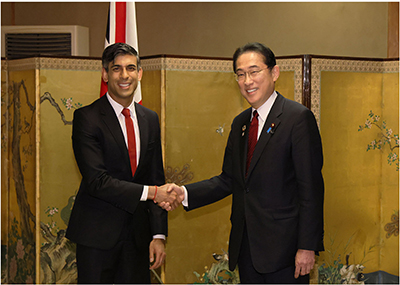 Japan-UK Summit Meeting (May 18, Hiroshima Prefecture; Photo: Cabinet Public Affairs Office)
Japan-UK Summit Meeting (May 18, Hiroshima Prefecture; Photo: Cabinet Public Affairs Office)At the foreign minister level, Foreign Minister Hayashi and Secretary of State for Foreign, Commonwealth and Development Affairs James Cleverly conducted a telephone call in March, an informal talk during the Meeting of NATO Ministers of Foreign Affairs in April, and meetings during the G7 Foreign Ministers' Meeting in Karuizawa, Nagano in the same month and the Ukraine Recovery Conference in the UK in June. Foreign Minister Kamikawa and Secretary of State for Foreign, Commonwealth and Development Affairs Cleverly held a meeting during the United Nations (UN) General Assembly meeting in September, and a telephone call in October. During the G7 Foreign Ministers' meeting in November, Foreign Minister Kamikawa and Defense Minister KIHARA Minoru held the Fifth Japan-UK Foreign and Defence Ministers' Meeting (“2+2”), the first such “2+2” meeting to be held in about two years and nine months, with Secretary of State for Foreign, Commonwealth and Development Affairs Cleverly and Secretary of State for Defence Grant Shapps. Additionally, Foreign Minister Kamikawa and Secretary of State for Foreign, Commonwealth and Development Affairs Cleverly signed a memorandum of cooperation between Japan and the UK on people-to-people exchanges, and confirmed that the two countries would promote people-to-people exchanges in various fields, including youth exchanges. Foreign Minister Kamikawa held a telephone call with Secretary of State for Foreign, Commonwealth and Development Affairs David Cameron in November.
(3) France
In February, demonstrations against the pension reform bill proposed by the Government of France were held throughout the country, resulting in many arrests. President Emmanuel Macron, whose approval rating has been stagnant, reshuffled his cabinet in July, but only on a small scale. In September, elections were held for the Senate, and although there was a slight decline in right-wing seats and a slight increase in left-wing seats, they resulted in no major changes.
With respect to foreign affairs, at the initiative of President Macron, France held the Summit for a New Global Financing Pact in Paris in June, which was attended by Foreign Minister Hayashi from Japan. France also held the Paris Peace Forum and various related meetings in November. This played a role in stimulating international discussions on global challenges. In addition, with regard to the situation in Ukraine, France continued sanctions against Russia and support for Ukraine. Moreover, with regard to the situation in the Middle East, France has actively conducted diplomatic activities toward stabilizing the situation. President Macron and Minister for Europe and Foreign Affairs Catherine Colonna visited Middle Eastern countries and held the International Humanitarian Conference for the Civilian Population in Gaza in November, which was attended by Parliamentary Vice-Minister for Foreign Affairs FUKAZAWA Yoichi from Japan. With regard to Africa, President Macron is aiming to build a new partnership with the region by reducing the number of French troops stationed in the region and strengthening economic relations, but this is facing growing anti-French sentiment in the former colonies and Russian advances in the region.
With regard to Japan-France relations, on January 1, the Government of Japan opened a consular office in Nouméa in New Caledonia, a French territory which is an important geopolitical point in the Indo-Pacific region.
In 2023, dialogues were held at various levels, including the summit and foreign minister levels. This began with Prime Minister Kishida's visit to France in January. In April, Foreign Minister Hayashi held a foreign ministers' meeting with Minister for Europe and Foreign Affairs Colonna, who was visiting Japan to attend the G7 Foreign Ministers' Meeting in Karuizawa, Nagano, in which the ministers concurred to further promote Japan-France cooperation in the Indo-Pacific. In May, Foreign Minister Hayashi and Defense Minister HAMADA Yasukazu held the Seventh Japan-France Foreign and Defense Ministers' Meeting (“2+2”) via videoconference with Minister for Europe and Foreign Affairs Colonna and Minister for Armed Forces Sébastien Lecornu. In the same month, Prime Minister Kishida held a meeting in Hiroshima with President Macron, who was visiting Japan for the G7 Summit, in which the leaders concurred to further deepen bilateral cooperation in a wide range of fields, including security and economic fields. They also concurred to strengthen cooperation in the start-up sectors, including sending 100 Japanese entrepreneurs to France over a five-year period, as well as cooperation on civil nuclear energy. In June, during his visit to Paris to attend the Summit for a New Global Financing Pact, Foreign Minister Hayashi held a meeting with Minister for Europe and Foreign Affairs Colonna, in which they concurred to set up a working group on economic security in the diplomatic sphere. In September, during the UN General Assembly, Foreign Minister Kamikawa held her first Japan-France Foreign Ministers' Meeting with Minister for Europe and Foreign Affairs Colonna. In October, Prime Minister Kishida and Foreign Minister Kamikawa respectively held telephone calls with President Macron and Minister for Europe and Foreign Affairs Colonna, in which they exchanged views on the situation in the Middle East. In November, Foreign Minister Kamikawa held a meeting with Minister for Europe and Foreign Affairs Colonna, who was visiting Japan to attend the G7 Foreign Ministers' Meeting. In December, during his visit to Dubai, United Arab Emirates (UAE) to attend the Conference of the Parties to the United Nations Framework Convention on Climate Change (COP28), Prime Minister Kishida held a telephone call with President Macron and they issued the Roadmap on Japan-France Cooperation under the “Exceptional Partnership.”
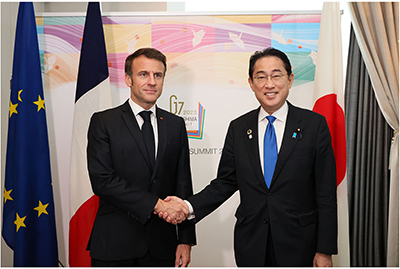 Japan-France Summit Meeting (May 19, Hiroshima Prefecture; Photo: Cabinet Public Affairs Office)
Japan-France Summit Meeting (May 19, Hiroshima Prefecture; Photo: Cabinet Public Affairs Office)(4) Germany
The three-party coalition government (the so-called “traffic light coalition”) consisting of the Social Democratic Party (SPD), the Green Party, and the Free Democratic Party (FDP) has continued to work intensively to respond to the situation in Ukraine on the diplomatic front, including the decision to provide Leopard 2 battle tanks in January. In addition, with regard to the situation in Israel and Palestine, Federal Chancellor Olaf Scholz and Federal Foreign Minister Annalena Baerbock visited Israel to show solidarity and to alleviate the situation, including the improvement of the humanitarian situation in Gaza. With regard to the domestic politics of Germany, while the combined approval rating of the three ruling parties has been below 50% against the backdrop of soaring energy and commodity prices and immigration issues, there have been major increases in the approval ratings of the opposition Christian Democratic Union of Germany and Christian Social Union in Bavaria (CDU/CSU), which has been increasingly critical toward the government, as well as the far-right Alternative for Germany (AfD) party. State elections were held in four states (Berlin, Bavaria, Hesse, and Bremen). The Social Democratic Party (SPD), Free Democratic Party (FDP), and Greens struggled in many states, while the AfD gained ground in many states. In November, the federal government released its Second Supplementary Budget 2021 in which 60 billion euros, earmarked for the COVID-19 crisis, were reallocated to the original measures of domestic climate change in the country from 2023. The German Constitutional Court ruled that the budget was unconstitutional, creating a situation in which the government was in a bind to pass the budget. Uncertainty in domestic politics has increased, and future developments will be closely observed.
With regard to Japan-Germany relations, the first meeting of the Japan-Germany Inter-Governmental Consultations was held in March on the theme of economic security. Chancellor Olaf Scholz, Federal Minister for Economic Affairs and Climate Action Robert Habeck, Federal Minister of the Interior and Community Christian Lindner, Federal Minister for Foreign Affairs Baerbock, Federal Minister of the Interior and Community Nancy Faeser, Federal Minister of Defense Boris Pistorius, and Federal Minister for Digital and Transport Volker Wissing all visited Japan for the consultations. Bilateral meetings between the ministers including the Japan-Germany Summit, and a plenary session bringing together all relevant ministers from the two countries were conducted. In addition, German dignitaries visited Japan on the occasion of the G7, for which Japan held the Presidency.
For example, Chancellor Scholz visited Japan for the G7 Hiroshima Summit in May, and Federal Minister for Foreign Affairs Baerbock visited Japan for the G7 Foreign Ministers' Meetings held in April and November. In the bilateral meetings, the two countries further strengthened their relations as important partners that share fundamental values, including sharing the recognition to continue close cooperation in the realization of FOIP and the response to the situation in Ukraine. In addition, in September, official negotiations between the governments of Japan and Germany began toward the conclusion of the Japan-Germany Acquisition and Cross-Servicing Agreement (Japan-Germany ACSA) as a legal framework to promote joint activities between the Japan Self-Defense Forces (SDF) and the German military, and an agreement in principle was reached in November.
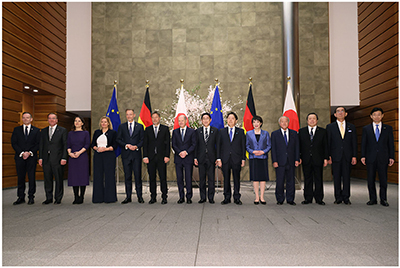 First meeting of the Japan-Germany Inter-Governmental Consultations (March 18, Tokyo; Photo: Cabinet Public Affairs Office)
First meeting of the Japan-Germany Inter-Governmental Consultations (March 18, Tokyo; Photo: Cabinet Public Affairs Office)(5) Italy
Immediately after being inaugurated, the administration of Prime Minister Giorgia Meloni began taking a cooperative policy with Europe and the U.S. on the diplomatic and economic fronts, including declaring its support and continued assistance for Ukraine with regard to Russia's aggression against Ukraine, and maintaining constructive relations with the EU to obtain additional funds for the National Recovery and Resilience Plan. On domestic policy, the government's approval rating, which was in the 50% range at the time of its inauguration, has been gradually declining due in part to soaring prices that have directly affected people's lives and the rapid increase in unauthorized immigrants but has remained in the 40% range. In recent years, even in the Lazio region (capital: Rome), which had been governed by the left, the unified candidate of the center-right party, which is part of the ruling coalition, won the election, indicating that the center-right is gaining more seats at the local level.
As for Japan-Italy relations, there was dialogue at various levels, including at the summit and foreign minister levels, in light of the fact that it was concurred to upgrade Japan-Italy relations to a “Strategic Partnership” during Prime Minister Kishida's visit to Italy in January. In February, Foreign Minister Hayashi held a meeting with Minister of Foreign Affairs and International Cooperation Antonio Tajani during his visit to New York to attend the emergency special session on Ukraine of the UN General Assembly and the ministerial debate at the UN Security Council. Foreign Minister Hayashi also met with Minister of Foreign Affairs and International Cooperation Tajani during the G7 Foreign Ministers' Meeting in Karuizawa, Nagano in April. During these meetings, Japan and Italy, which would assume the G7 Presidency following Japan, confirmed the importance of further strengthening cooperation as strategic partners.
Prime Minister Kishida held a meeting with Prime Minister Meloni during her visit to Japan in May to attend the G7 Hiroshima Summit. The two leaders shared the view to further deepen bilateral cooperation in a wide range of fields, including defense, security, and economic fields. Furthermore, the two leaders welcomed the conclusion of negotiations on the Japan-Italy Film Co-production Agreement, and in June, Foreign Minister Hayashi signed the Agreement with Minister of Culture Gennaro Sangiuliano, who was visiting Japan.
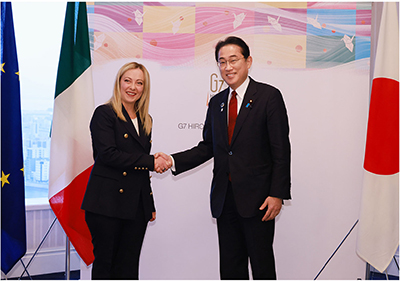 Japan-Italy Summit Meeting (May 18, Hiroshima Prefecture; Photo: Cabinet Public Affairs Office)
Japan-Italy Summit Meeting (May 18, Hiroshima Prefecture; Photo: Cabinet Public Affairs Office)In November, Foreign Minister Kamikawa held an informal talk with Minister of Foreign Affairs and International Cooperation Tajani, who was visiting Japan to attend the G7 Foreign Ministers' Meeting. The ministers exchanged views on pressing international issues, including the situation in the Middle East, and affirmed that they would carry out the transfer of the G7 Presidency at various levels. In December, during his visit to Dubai, UAE to attend COP28, Prime Minister Kishida held a meeting with Prime Minister Meloni, in which they concurred on close bilateral cooperation to continue the discussions of the G7 in 2023 under the upcoming Italian G7 Presidency. Furthermore, in February 2024, Prime Minister Meloni visited Japan and held a meeting with Prime Minister Kishida. The leaders concurred on close cooperation in a wide range of fields upon discussing bilateral relations, regional affairs, and responses to various issues in the international community, with a view to cooperating for the success of the G7 in 2024 under Italy's Presidency, and to further promote Japan-Italy relations, which have made dramatic progress in recent years.
(6) Spain
On July 23, parliamentary elections were held for both the Congress of Deputies and Senate, and, as a result, the opposition Popular Party (PP) became the leading party. However, PP leader Alberto Núñez Feijóo did not manage to win the required number of votes in a vote of confidence for prime minister in the Congress of Deputies in September. In October, interim Prime Minister Pedro Sánchez of the ruling Spanish Socialist Workers' Party (PSOE) was nominated as the candidate for the next prime minister. In November, with the support of leftist parties, including regionalist parties in Catalonia and the Basque Country, he was confirmed by the Congress of Deputies and reappointed as prime minister.
In regard to Japan-Spain relations, the two countries are strengthening their cooperation under the strategic partnership, which was upgraded upon concurrence at the summit in 2018. In February, Foreign Minister Hayashi, who was attending the emergency special session on Ukraine of the UN General Assembly in New York, held a meeting with Foreign Minister José Manuel Albares, in which they discussed matters including cooperation to defend the international order based on the rule of law between Japan, which held the G7 Presidency and was a non-permanent member of the UN Security Council in 2023, and Spain, which assumed the EU Presidency in the latter half of the year. In addition, there was progress in cooperation between the public and private sectors, including the 23rd Japan-Spain Symposium, which was held in Salamanca, Spain in November.
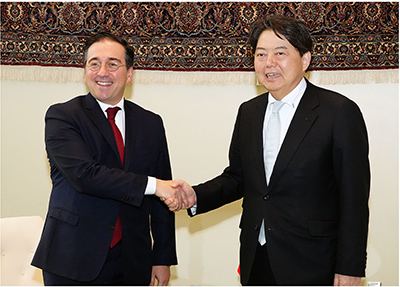 Japan-Spain Foreign Ministers' Meeting (February 23, New York, U.S.)
Japan-Spain Foreign Ministers' Meeting (February 23, New York, U.S.)(7) Poland
General elections were held in October, and although the ruling Law and Justice (PiS) party became the leading party in the lower house, it failed to win a majority, and a new coalition government headed by Prime Minister Donald Tusk, leader of the Civic Platform (PO) party, was formed in December.
Poland, as Ukraine's neighbor, actively responds to Russia's aggression against Ukraine, playing a major role as a hub of support for Ukraine. The protracted aggression has increased the burden and vulnerability of Poland, which has accepted many Ukrainian evacuees. In February, Japan decided to provide Official Development Assistance (ODA) directly to Poland in order to alleviate this burden and effectively provide humanitarian, recovery, and reconstruction assistance to Ukraine.
In regard to Japan-Poland relations, there were frequent high-level mutual visits by dignitaries.
In March, Prime Minister Kishida, the first Japanese prime minister to visit Poland in 10 years, held summit meetings respectively with President Andrzej Duda and Prime Minister Mateusz Morawiecki, in which he expressed gratitude for Poland's cooperation for his visit to Ukraine, and held candid exchanges of views regarding the situation in Ukraine and ways to further progress bilateral relations. In April, Foreign Minister Hayashi held a meeting with Foreign Minister Zbigniew Rau during his visit to Belgium to attend the Meeting of NATO Ministers of Foreign Affairs. In May, Foreign Minister Rau visited Japan (the first such visit by a Polish foreign minister in six years) and held a meeting with Foreign Minister Hayashi. In July, Prime Minister Kishida visited Poland and held a summit meeting with Prime Minister Morawiecki, in which the leaders concurred to further strengthen economic relations and to promote bilateral cooperation on the regional situations in Ukraine and the Indo-Pacific region. Furthermore, in September, Foreign Minister Hayashi visited Poland and held a meeting with Foreign Minister Rau for the third time in 2023. In January 2024, Foreign Minister Kamikawa visited Poland after the new administration was inaugurated. She paid a courtesy call to President Duda and held her first Japan-Poland Foreign Ministers' Meeting with Foreign Minister Radosław Sikorski, in which she confirmed that Japan will continue to strengthen the strategic partnership relationship with the new administration.
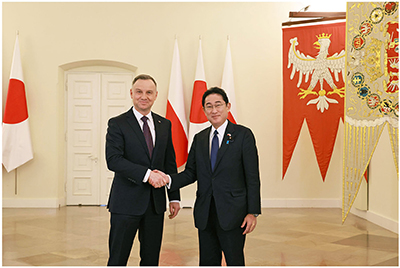 Japan-Poland Summit Meeting with President Duda (March 22, Warsaw, Poland; Photo: Cabinet Public Affairs Office)
Japan-Poland Summit Meeting with President Duda (March 22, Warsaw, Poland; Photo: Cabinet Public Affairs Office)(8) Ukraine
Amid the ongoing Russia's aggression against Ukraine that was started in February 2022, a Japan-Ukraine Summit telephone call was held on January 6, 2023, during which Prime Minister Kishida conveyed to President Volodymyr Zelenskyy that Japan would play an active role as the G7 Presidency that same year. Furthermore, on February 18, Foreign Minister Hayashi, who was visiting Germany to attend the Munich Security Conference, held a foreign ministers' meeting with Foreign Minister Dmytro Kuleba.
On February 24, one year after the start of Russia's aggression, Prime Minister Kishida held the G7 Leaders' Video Conference. The meeting opened with remarks by President Zelenskyy, followed by discussions among the G7 leaders, and the G7 Leaders' Statement was issued after the meeting. In addition, Foreign Minister Hayashi attended the emergency special session on Ukraine of the UN General Assembly (February 23) and the ministerial debate at the UN Security Council (February 24), both held in New York.
On March 21, Prime Minister Kishida visited Ukraine and held a summit meeting with President Zelenskyy. Both leaders concurred to further strengthen cooperation and issued the Joint Statement on Special Global Partnership Between Japan and Ukraine. In addition, on the same day, Prime Minister Kishida visited Bucha City on the outskirts of Kyiv and offered flowers at a memorial for the war dead.
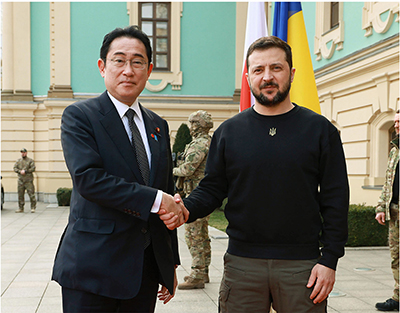 Japan-Ukraine Summit Meeting (March 22, Kyiv, Ukraine; Photo: Cabinet Public Affairs Office)
Japan-Ukraine Summit Meeting (March 22, Kyiv, Ukraine; Photo: Cabinet Public Affairs Office)On April 4, Foreign Minister Hayashi, who was visiting Belgium to attend the Meeting of NATO Ministers of Foreign Affairs, held a foreign ministers' meeting with Foreign Minister Kuleba. In addition, on May 12, the Preparatory Meeting on the Reconstruction of Ukraine was established with the aim of close cooperation among relevant ministries and agencies on the promotion of reconstruction of Ukraine by the Japanese public and private sectors. There were three such meetings in 2023.
At the G7 Hiroshima Summit held from May 19 to 21, the G7 leaders also discussed the situation in Ukraine and issued the G7 Leaders' Statement on Ukraine. In addition, President Zelenskyy visited Japan from May 20 to 21 and participated in the session on Ukraine with the G7 leaders, as well as in the session on peace and stability with the G7 leaders and leaders of invited countries (See the Opening Special Feature on page 2 and Chapter 3, Section 3, 3 (1)). Prime Minister Kishida also held a summit meeting with President Zelenskyy and expressed his desire to further expand and deepen cooperation with Ukraine and to exercise leadership as the G7 Presidency based on the outcomes of the G7 Hiroshima Summit and the Japan-Ukraine Summit Meeting. Moreover, President Zelenskyy visited the Hiroshima Peace Memorial Museum, where he and Prime Minister Kishida laid a wreath at the Cenotaph for the Atomic Bomb Victims.
During the Japan-Ukraine summit telephone call on June 9, Prime Minister Kishida and President Zelenskyy exchanged views on the impact of the collapse of the dam at the Kakhovka Hydroelectric Power Plant that occurred the same month. In addition, from June 15 to 20, Deputy Prime Minister for Restoration of Ukraine and Minister for Communities, Territories and Infrastructure Development of Ukraine Oleksandr Kubrakov visited Japan, attended the G7 Transport Ministers' Meeting in Ise-Shima, Mie, and exchanged views with related parties. On June 21, Foreign Minister Hayashi attended the Ukraine Recovery Conference (London, UK) and paid a courtesy call to Prime Minister Denys Shmyhal.
At the NATO Summit Meeting in Vilnius, Lithuania in July, the Joint Declaration of Support for Ukraine was announced, and the G7 leaders, including Prime Minister Kishida, and President Zelenskyy attended the ceremony to issue the declaration (on October 7, the first round of negotiations on the preparation of the bilateral document between Japan and Ukraine, based on the “Joint Declaration of Support for Ukraine” were held). This was followed by another Japan-Ukraine summit telephone call on August 29.
On September 9, Foreign Minister Hayashi visited Ukraine with representatives of Japanese companies, paid courtesy calls to President Zelenskyy and Prime Minister Shmyhal, and held a foreign ministers' meeting. At the courtesy call to President Zelenskyy, Foreign Minister Hayashi stated that he would like to support the recovery and reconstruction of Ukraine through public and private sector engagement taking the opportunity that the Japanese company representatives are joining this visit with a view to the Japan-Ukraine Conference for Promotion of Economic Growth and Reconstruction scheduled for the beginning of 2024. During his visit, Foreign Minister Hayashi visited Bucha City on the outskirts of Kyiv and attended a ceremony to hand over crane trucks to Ukraine's State Emergency Service. Furthermore, on September 20, during his visit to New York to attend the UN General Assembly, Prime Minister Kishida attended the UN Security Council High Level Open Debate on “Upholding the purposes and principles of the UN Charter through effective multilateralism: maintenance of peace and security of Ukraine” (with Foreign Minister Kamikawa also in attendance), and Foreign Minister Kamikawa held a foreign ministers' meeting with Foreign Minister Kuleba. On October 3, Prime Minister Kishida participated in the Summit-Level Teleconference on the situation in Ukraine with other like-minded countries at the invitation of President Joseph Biden of the U.S.
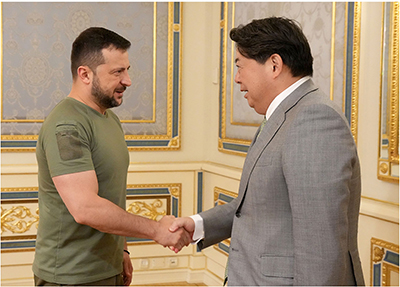 Foreign Minister Hayashi pays a courtesy call to President Zelenskyy (September 9, Kyiv, Ukraine)
Foreign Minister Hayashi pays a courtesy call to President Zelenskyy (September 9, Kyiv, Ukraine)On November 8, during the Japan-Ukraine summit telephone call, Prime Minister Kishida and President Zelenskyy concurred to hold the Japan-Ukraine Conference for Promotion of Economic Growth and Reconstruction in Tokyo on February 19, 2024. On November 20, State Minister for Foreign Affairs TSUJI Kiyoto and State Minister of Economy, Trade, and Industry IWATA Kazuchika visited Ukraine together with Japanese business representatives and exchanged views mainly on efforts for Ukraine's recovery and reconstruction with Prime Minister Shmyhal and other government officials as well as Ukrainian business representatives, including the Chamber of Commerce and Industry.
On December 6, Prime Minister Kishida held the G7 Leaders' Video Conference. The meeting opened with remarks by President Zelenskyy, followed by discussions among the G7 leaders, which reaffirmed the G7's unwavering solidarity with Ukraine, and the G7 leaders concurred to remain united in strongly promoting sanctions against Russia and support for Ukraine.
On January 7, 2024, Foreign Minister Kamikawa visited Ukraine, paid courtesy calls to President Zelenskyy and Prime Minister Shmyhal, and held a foreign ministers' meeting with Foreign Minister Kuleba. Foreign Minister Kamikawa directly conveyed Japan's steadfast basic stance of standing with Ukraine. In addition, Foreign Minister Kamikawa announced that Japan would contribute approximately 37 million U.S. dollars to NATO's Comprehensive Assistance Package (CAP) Trust Fund for Ukraine and provide an unmanned aircraft detection system. She also attended the ceremony for the provision of five mobile gas turbine generators and logistic support for the transport of seven large transformers as winterization assistance. During this visit, Foreign Minister Kamikawa visited Bucha City and inspected the bridge over the Irpin River near the city. She also visited the facility established by the United Nations Children's Fund (UNICEF) to provide assistance to women and children at Kyiv Central Railway Station, and exchanged views with people, including representatives of international organizations stationed in Ukraine.
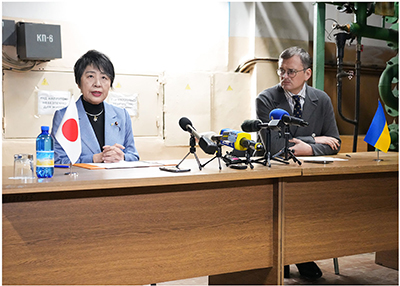 Joint press conference with the foreign ministers of Japan and Ukraine. Due to an air raid warning, the press conference was held in an underground shelter at short notice (January 7, 2024, Kyiv, Ukraine).
Joint press conference with the foreign ministers of Japan and Ukraine. Due to an air raid warning, the press conference was held in an underground shelter at short notice (January 7, 2024, Kyiv, Ukraine).On February 19, 2024, the Japan-Ukraine Conference for Promotion of Economic Growth and Reconstruction was held in Tokyo with the participation of Prime Minister Shmyhal. At the Leaders' Session of the Conference, Prime Minister Kishida identified the support for Ukraine as an investment for the future of both countries and the entire world, emphasized that Ukraine's recovery is in the interest of Japan and the international community as a whole, and expressed that Japan would support Ukraine's recovery and reconstruction through both the public and private sectors involvement. As a result of the Conference, 56 cooperation documents from both the public and private sectors were presented. In addition, at the Conference, Foreign Minister Kamikawa held the Women, Peace, and Security (WPS) Session, during which organic discussions took place between women active in the Government of Ukraine, business, and civil society in order to incorporate women's and children's perspectives into recovery and reconstruction efforts. The meeting provided an opportunity to deliver a strong message to the international community on the need for continued support to Ukraine. On the same day, Prime Minister Shmyhal held a meeting with Prime Minister Kishida, had a dinner meeting with Chief Cabinet Secretary HAYASHI Yoshimasa, and had an informal talk with Foreign Minister Kamikawa. Prime Minister Kishida told Prime Minister Shmyhal that the Conference had achieved remarkable results, including the release of more than 50 cooperation documents from the public and private sectors, and the two leaders concurred to continue to closely follow up the outcomes of Prime Minister Shmyhal's visit to Japan and the Conference. In addition, Foreign Minister Kamikawa and Prime Minister Shmyhal also concurred to maintain coordination between the two governments to further strengthen bilateral relations and cooperation in the international arena (See the Special Feature on page 27).
The Government of Japan will continue to impose severe sanctions against Russia and provide strong support to Ukraine in order to stop Russia's aggression as soon as possible and realize a just and lasting peace in Ukraine. Japan will also accelerate public-private sector initiatives for the recovery and reconstruction of Ukraine based on the outcomes of the Japan-Ukraine Conference for Promotion of Economic Growth and Reconstruction.
